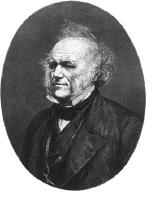Sir Charles Lyell
Geologist, b. 14 November 1797 (Kinnordy, Forfarshire, Scotland), d. 22 February 1875 (London, England).
 Charles Lyell, the eldest of ten children in a wealthy Scottish family, grew up near Southampton on England's south coast, where his parents had moved when Charles was two years old. His father was a naturalist, and the young Charles preferred his father's instructions about nature to the formal education he received at various private schools. For many years he collected butterflies and insects, a hobby most fellow villagers found unsuitable for a young man.
Charles Lyell, the eldest of ten children in a wealthy Scottish family, grew up near Southampton on England's south coast, where his parents had moved when Charles was two years old. His father was a naturalist, and the young Charles preferred his father's instructions about nature to the formal education he received at various private schools. For many years he collected butterflies and insects, a hobby most fellow villagers found unsuitable for a young man.
After entering Oxford University in 1817 Lyell's interest turned to the classics, mathematics and particularly geology, where he absorbed the lectures of William Buckland, who attempted to use fossil finds to prove the biblical flood. In 1819 Lyell received his B.A. with honours and moved to London to study law.
Lyell's law studies were somewhat hampered by his deteriorating eyesight, and he preferred to go on geological field excursions. In 1823 he spent time in Paris, where he met Alexander von Humboldt and George Cuvier, and took part in geological studies of the Paris Basin. He completed his law degree in 1925 and was admitted to the bar but continued his geological studies, supported financially by his father, and began to publish papers on geology.
The common geological teaching of the time said that the Earth was shaped by a few cataclysmic events and that its history spanned a few thousand years. Lyell's field studies had convinced him that of the falseness of this theory. He believed that the same geological processes such as weathering, sedimentation, occasional volcanic eruptions and lava flow were responsible for the geological development of the past, that divine intervention was unnecessary to explain the face of the Earth, and that to allow the slow natural processes to act the Earth must be of very great age (a position known since Hutton as uniformitarianism).
In 1828 and 1829 Lyell travelled through France and through the length of Italy in search of proof for his theory and found much more than he had expected.On his return to London he wrote Principles of Geology; it appeared in three volumes between 1830 and 1833. In 1832 he married Mary Horner of Bonn, Germany. Mary shared his interest in geology, and for the rest of her life she and her husband worked as a most efficient team.
The Principles of Geology sold well, and repeatedly updated editions allowed the Lyells to continue geological research without other employment. They travelled widely, visiting Scandinavia and other European countries and North America and giving lectures that attracted thousands of men and women from all classes.
Before Lyell most geological publications consisted merely of narrative descriptions of rocks, strata, fossils etc. The success of Principles of Geology came from Lyell's approach to collect facts for the purpose of supporting or rejecting a hypothesis. Darwin's reaction to the book demonstrates the impact of Lyell's method; he wrote:
- "The very first place which I examined ... showed my clearly the wonderful superiority of Lyell's manner of treating geology, compared with that of any other author, whose work I had with me or ever afterwards read."
Darwin published his Origin of Species in 1859. Lyell had been sceptical about evolution, but after reading Darwin's work he published The Geological Evidence of the Antiquity of Man in 1863, and in new editions of the Principles of Geology he included new geological evidence in support of evolution.
Lyell was knighted in 1848. He received the Copley Medal, the highest award of the Royal Society, in 1858. He died while revising the 12th edition of the Principles of Geology and was buried in Westminster Abbey.
Reference
Macomber, R. W. (1995) Sir Charles Lyell, Baronet, Encyclopaedia Britannica 15th ed.
home
 Charles Lyell, the eldest of ten children in a wealthy Scottish family, grew up near Southampton on England's south coast, where his parents had moved when Charles was two years old. His father was a naturalist, and the young Charles preferred his father's instructions about nature to the formal education he received at various private schools. For many years he collected butterflies and insects, a hobby most fellow villagers found unsuitable for a young man.
Charles Lyell, the eldest of ten children in a wealthy Scottish family, grew up near Southampton on England's south coast, where his parents had moved when Charles was two years old. His father was a naturalist, and the young Charles preferred his father's instructions about nature to the formal education he received at various private schools. For many years he collected butterflies and insects, a hobby most fellow villagers found unsuitable for a young man.